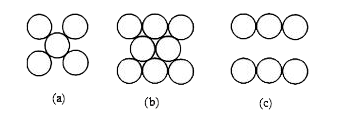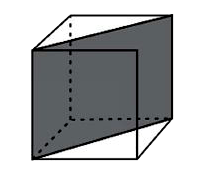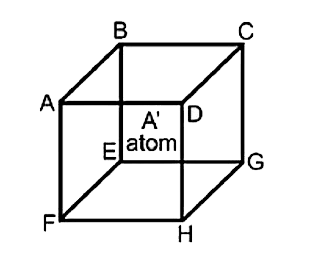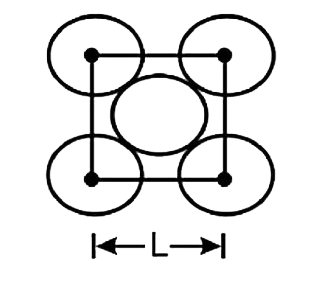Complete Solutions to MULTIPLE CHOICE QUESTIONS of chapter SOLID STATE TEST of Class 12 book with complete answers and questions
| Class 12 | CHEMISTRY |
| Chapter | SOLID STATE TEST |
| NTA MOCK TESTS | MULTIPLE CHOICE QUESTIONS |
| Number Of Questions | 30 |
| Academic Year | 2023-24 |
CaBr has bcc structure edge length `4.3 Å.` The shortest inter ionic distance in between `Cs ^(+) and Br ^(-)` is
View SolutionA metallic elemnt crystallise into lattice having a layering sequence of ABABAB. Any packing of sphere leaves out voids in the lattice. Determine what percentage by volume of this lattice is empty space.
View SolutionIn face-centred cubic (FCC) and body centred cubic (BCC), whose unit cell lengths are 3.5 and 3.0 Å respectively, a metal crystallises into two cubic phases. What is the ratio of densities of FCC and BCC?
View SolutionThe figures given below show the location of atoms in three crystallographic planes in a FCC lattice.

The planes in the unit cell have been highlighted in the diagram below choose the correct option.

View SolutionIn NaCl crystal, the nature of the defect is:
View SolutionIn face centred cubic arrangement of A and B atoms, A atoms are at the corners of the unit cell and B atoms at the face centres. One of the A atoms is missing from one corner in the unit cell. The simplest formula of the compound is
View SolutionIn a hypothetical solid, C atoms are found to form cubical close-packed lattice. A atoms occupy all tetrahedral voids and B atoms occupy all octahedral voids.

A and B atoms are of appropriate size, so that there is no distortion in the CCP lattice of C atoms. Now, if a plane as shown in the following figure is cut, then the cross section of this plane will look like
View SolutionIn normal spinel structures `Mg Al _(2) , O _(4),` the precentage of tetrahedral void occupied is
View SolutionThe appearance of colour in solid alkali metal halides is generally due to the
View SolutionIn the given body- centred cubic AB, AC, and AA' are :

View SolutionThe packing efficiency of the two- dimensional square unit cell shown below is

View SolutionOxygen atom forms FCC unit cell with 'A' atoms occupying all tetrahedral voids and 'B' atoms occupying all octahedral voids. If atoms are removed from two of the body diagonals then determine the formula of resultant compound formed.
View SolutionWhich of the following is not correct for ionic crystals?
View SolutionFerrous oxide has a cubic structure and each edge of the unit cell is 5.0 Å. Assuming density of the oxide as `4.0 g cm^(2)` then the number of `Fe^(2+) and O^(2-)` ions present in each unit cell will be
View Solution‘C'represent the height of the HCP unit cell and 'a' represent edge length of the hexagonal surface of the HCP unit cell. What is the value of C/a?
View SolutionWith `11.35 g//cm^(3)` density, a group IV A element crystallises in a face centred cubic lattice, whose unit cell edge length being 4.95 Å. Calculate its atomic mass.
View SolutionA compound formed by elements A and B crystallize in a cubic structure, where atoms of A are at the corners of a cube and atoms of B are at the face centre of a cube. What is the formula of the compound formed?
View SolutionConsider a binary solid `(A^(+)B^(-))` of rock salt structure with an edge length of 400 pm. If the radius of cation is 75 pm, then what is the radius of anion?
View SolutionNa and Mg crystallize in BCC and FCC crystals, respectively. How many atoms of Na and Mg are present in the unit cell of their respective crystals?
View SolutionThe co-ordination number of metal crystallizing in a hexagonal close packed structure is
View SolutionThe unite with crystallographic dimensions ,`a = b ne c ` is
`alpha = beta = gamma = 90^(@)`
View SolutionA solid has a bcc structure. If the distance of closest approach between the two atoms is `1 . 73 Å.` The edge length of the cell is :
View SolutionFor an ionic crystal of the general formula AX and coordination, the number is 6:6. The value of the radius ratio will be
View SolutionHow many octahedral and tetrahedral holes are present per unit cell in a face centred cubic arrangement of atoms?
View SolutionThe density of KBr is `2.75 g cm^(-3),` length of the unit cell is 654 pm. K = 39, Br = 80, then what can be true about the predicted nature of the solid? (Given: `N_(A) = 6.023 xx 10 ^(23))`
View SolutionThe radius ratio of KF is 0.98. The structure of KF is of the type
View SolutionThe void space in a primitive unit cell is :
View SolutionThe molecular formula of a non stoichimetrix tin oxide containing Sn (ll) and Sn (lV) ions is `Sn _(444) O _(8).`
Therefore, the molar ratio of Sn (ll) to Sn (IV) is approximately
View SolutionHow many units of NaCl is present per unit cell of NaCl ?
View SolutionA body centre cubic lattice is made up of two different types of atoms A and B. Atom A occupies the body centre and B occupying the corner positions. One of the corners is left unoccupied per unit cell. Empirical formula of such a solid is
View Solution
MULTIPLE CHOICE QUESTIONS questions and complete solutions for chapter SOLID STATE TEST of NTA MOCK TESTS of Class 12